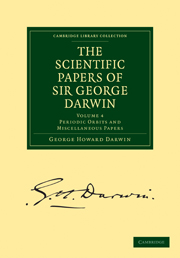Book contents
- Frontmatter
- PREFACE
- Contents
- Chronological List of Papers with References to the Volumes in which they are contained
- Errata
- PART I PERIODIC ORBITS
- PART II THE TIDES
- PART III MISCELLANEOUS PAPERS IN CHRONOLOGICAL ORDER
- PART IV PAPERS ON TIDES (Supplementary to Volume I)
- PART V ADDRESSES TO SOCIETIES
- 24 Geological Time
- 25 Presentation of the Medal of the Royal Astronomical Society to M. Henri Poincaré
- 26 Cosmical Evolution
- APPENDIX
- INDEX
- Plate section
26 - Cosmical Evolution
Published online by Cambridge University Press: 07 September 2010
- Frontmatter
- PREFACE
- Contents
- Chronological List of Papers with References to the Volumes in which they are contained
- Errata
- PART I PERIODIC ORBITS
- PART II THE TIDES
- PART III MISCELLANEOUS PAPERS IN CHRONOLOGICAL ORDER
- PART IV PAPERS ON TIDES (Supplementary to Volume I)
- PART V ADDRESSES TO SOCIETIES
- 24 Geological Time
- 25 Presentation of the Medal of the Royal Astronomical Society to M. Henri Poincaré
- 26 Cosmical Evolution
- APPENDIX
- INDEX
- Plate section
Summary
Bartholomeu Diaz, the discoverer of the Cape of Storms, spent sixteen months on his voyage, and the little flotilla of Vasco da Gama, sailing from Lisbon on July 8, 1497, only reached the Cape in the middle of November. These bold men, sailing in their puny fishing smacks to unknown lands, met the perils of the sea and the attacks of savages with equal courage. How great was the danger of such a voyage may be gathered from the fact that less than half the men who sailed with da Gama lived to return to Lisbon. Four hundred and eight years have passed since that voyage, and a ship of 13,000 tons has just brought us here, in safety and luxury, in but little more than a fortnight.
How striking are the contrasts presented by these events! On the one hand compare the courage, the endurance, and the persistence of the early navigators with the little that has been demanded of us; on the other hand consider how much man's power over the forces of Nature has been augmented during the past four centuries. The capacity for heroism is probably undiminished, but certainly the occasions are now rarer when it is demanded of us. If we are heroes, at least but few of us ever find it out, and, when we read stories of ancient feats of courage, it is hard to prevent an uneasy thought that, notwithstanding our boasted mechanical inventions, we are perhaps degenerate descendants of our great predecessors.
- Type
- Chapter
- Information
- The Scientific Papers of Sir George DarwinPeriodic Orbits and Miscellaneous Papers, pp. 520 - 552Publisher: Cambridge University PressPrint publication year: 2009First published in: 1911



